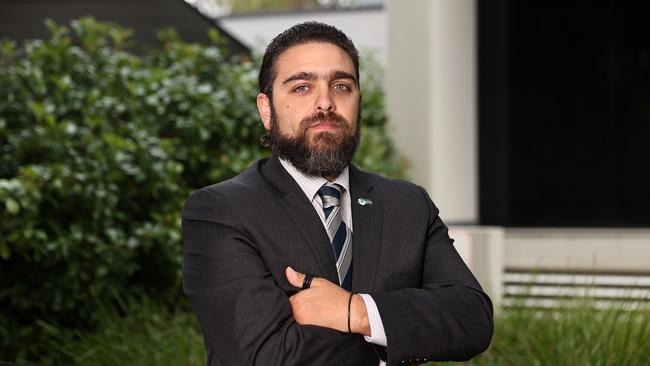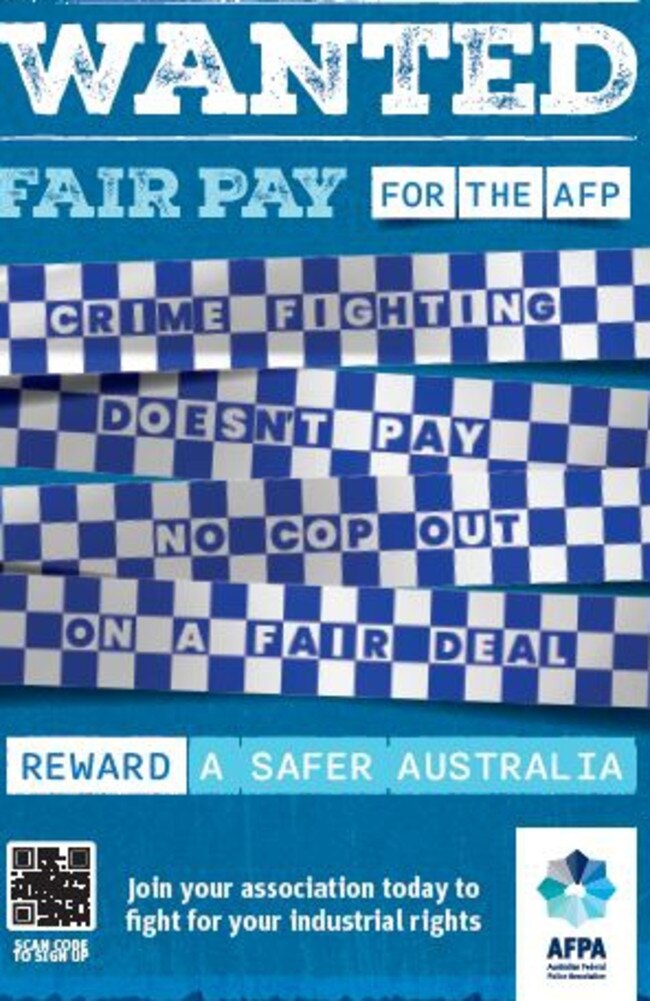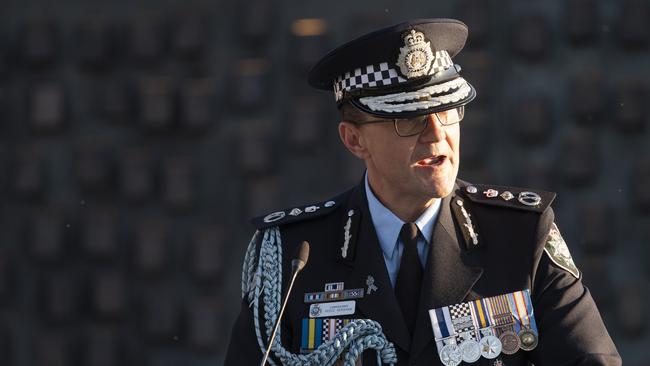Australian Federal Police officers vote to take strike action over pay and conditions
The history-making move could disrupt law enforcement across the country as a series of rolling strike actions over pay and conditions starts next week.
National
Don't miss out on the headlines from National. Followed categories will be added to My News.
Almost 100 per cent of Australian Federal Police officers have voted to take strike action over pay and conditions in a history-making move which could disrupt law enforcement across the country.
The Australian Federal Police Association (AFPA) have sent letters to the AFP executive giving them the required three days to five days’ notice that they will begin taking a series of rolling strike actions starting next week.
In a campaign designed to get the attention of the government, AFPA president Alex Caruana said they will be withdrawing close personal protection for low-risk politicians and foreign dignitaries.
“Someone else can take care of that,” Mr Caruana said.
Officers will also stop appearing as witnesses in court cases and will have to be subpoenaed to attend court. They will stop escorting witnesses and prisoners to court.
Police cars will be festooned with slogans such as “Lowest paid police largest jurisdiction” and “Crime fighting doesn’t pay” and “No cop out” in a bid to get the attention of the public and the government.

Mr Caruana said officers have in some cases been working 20 hour shifts protecting the Prime Minister Anthony Albanese – just going home to have a shower and then returning to duty.
He said officers have been given permission to speak up and tell the politicians they are protecting the terrible conditions they have had to endure to keep them safe.
Mr Caruana said it would be good if the AFP executive came out to support their members saying “we can’t keep Australia safe the way we have done in the past.”
He said it would be a good way for the AFP Commissioner Reece Kershaw, who is up for renewal, to cement his leadershhip.
“The government is treating us like public servants and we are not.”
One of the slogans that will be used on wristbands and lanyard that all offices will wear says “police protect you 24/7 but only get an 8-4 payrise.”

An AFP spokesman said the AFP is aware of the activities proposed by the AFP Association.
“Since September 2023 the AFP has bargained in good faith with AFPA, CPSU and independent bargaining representatives. The AFP intends to continue working constructively with all employee bargaining representatives to reach a final position on bargaining in the coming weeks,” the spokesman said.
“The AFP has put in place contingency plans to ensure there are no disruptions to operational capability, and no impacts to community safety.”
Thousands of criminal investigations and court cases may stall, warrants may not served, arrests not carried out and federal politicians could be left unprotected under the strike action.
The AFP officers association (AFPA) has put the AFP and government on notice that indefinite or periodic bans may be used to force negotiations for a new enterprise agreement after the Fair Work Commission backed their call for protected action.
The Australian Federal Police Association President Alex Caruana said the decision by the Commission is a positive step towards negotiating a new enterprise agreement.
“The approval to go to a protected action ballot is a crucial step, and we welcome the FWC’s decision in this respect. The ballot will determine whether AFP appointees have the option of taking industrial action in the future,” Mr Caruana said.
Tensions have reached boiling point and Federal Police Commissioner Reece Kershaw was confronted at a recent staff muster about officers being the lowest paid in the country while he was the highest paid commissioner.
It was reported the Commissioner told staff if they didn’t like it they could leave.
The AFP did not answer questions about the incident.

The AFPA has until March 8 to conclude the vote on behalf of thousands of officers who are responsible for guarding the nation’s critical infrastructure, politicians, dignitaries and monitoring released detainees among other police duties.
Mr Caruana has said the Federal Government should be embarrassed that the AFP had the lowest base-paid officers in the country.
“How can its premier law enforcement agency be the worst-paying in the country? AFP appointees should not have to undertake secondary employment to keep a roof over their heads and the lights turned on – yet many are,” Mr Caruana wrote.
Mr Caruana said they have a mandate after 75 per cent of their 1800 members who participated in a survey endorsed industrial action for a better pay offer.
He said the survey painted a picture the Federal Government and AFP executive should be concerned about, and a copy would be sent to every Member of Parliament.
The association has been fighting for a bigger pay rise than the 11.2 per cent given to public servants, arguing it was designed to appeal to desk-bound government employees and took in flexible work from home arrangements not applicable to police work.
“As the bargaining framework sits today, we can’t achieve this and would be lumped with an enterprise agreement unfit for an operational law enforcement agency,” Mr Caruana said.
“How can my (AFP) members stop a pedophile while working at home or stop a bullet in the face to the prime minister from their lounge room?” Mr Caruana has said.
Pay disparity was bad and it started with recruits, he said.
The strike action couldn’t come at a worse time for AFP Commissioner Kershaw.
He is believed to be seeking an extension to his contract which expires in September.
There is also bad blood between the AFP and most State police forces which senior law enforcement sources say is one the biggest problems facing cohesive law enforcement in this country.
It comes as it has been revealed a string of investigations are underway into the AFP over allegations they failed to protect compromised undercover operatives from dangerous organised crime figures.
An AFP spokesman said the AFP has increased the pace of enterprise bargaining meetings, and intends to put forward a pay offer in the next month.
“The AFP is working with members to ensure that any protected industrial action is managed appropriately and does not cause any disruption to operational capability or community safety,” the spokesman said.
He also said the AFPA has made it clear that any perceived or real impasse is not because of the AFP executive.
“The AFP continues to have a positive working relationship with the AFPA and is working closely with the Fair Work Commission on what appropriate actions may be taken by eligible members engaged in protected industrial action.”





